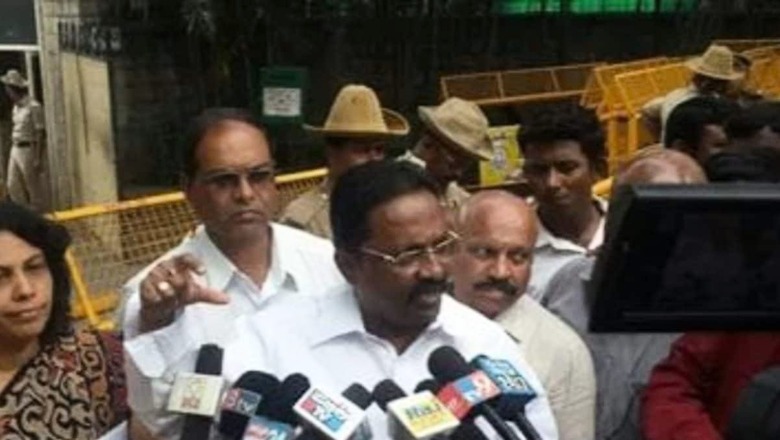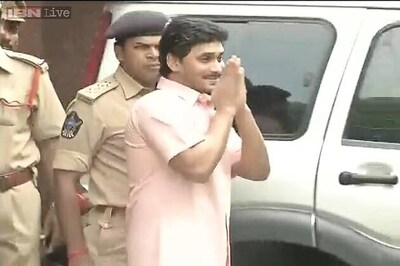
views
He has raised the hackles of many powerful men over the years. Anti-corruption crusader TJ Abraham has set his sights now on Karnataka’s chief minister, and not for the first time.
Having taken on at least four CMs — SM Krishna, HD Kumaraswamy, Dharam Singh, and BS Yediyurappa — since the late noughties, Abraham has made it five with Siddaramaiah. He filed a complaint with the Lokayukta police in Mysuru on July 18, stating that the allotment of 14 alternative compensatory sites in Mysuru’s upscale Vijayanagar to the chief minister’s wife, BM Parvathi, on January 5, 2022, was illegal and allegedly caused a Rs 45-crore loss to the state exchequer. In his complaint, he named CM Siddaramaiah, his wife Parvathi, Varuna MLA and Siddaramaiah’s son S Yathindra, Mysuru Urban Development Authority commissioner DB Natesh, and MUDA chief HV Rajeev.
“The village of Kesare has not existed since 2001. In 1997, MUDA acquired land to form the Devanuru 3rd Stage layout. Since then, the land has been under MUDA’s acquisition. Siddaramaiah’s family, with his influence, managed to get this piece of land denotified—a land that was in the name of a deceased man, Devaraju,” he told News18 in an exclusive conversation. “In 2004, Siddaramaiah’s brother-in-law claimed to hand over the property to his sister when, in reality, no such property existed. In 2004, Kesare village no longer existed; it was part of Devanur 3rd Stage, which was under MUDA. So what land did they buy?”
In interim relief from the state high court, Siddaramaiah will not face action until the trial court hears the case related to governor Thawar Chand Gehlot’s sanction for his prosecution in the case. Gehlot gave his nod following complaints from Abraham and two other private individuals.
“The court has instructed the trial court to defer the matter, which is a relief for me, not the chief minister. I will file a detailed response to all the questions raised and submit our objections,” Abraham told News18.
Siddaramaiah in his writ petition had argued that the sanction order was issued without proper consideration, violating statutory requirements and constitutional principles, including the advice of the council of ministers, which is binding under Article 163 of the Constitution of India.
“I sought an appointment with the governor on August 19 and received it on the 26th. Is that the action of a ‘friendly governor’? No. He found time and gave it to me. I narrated the whole situation to him, convincing him that there was no 3.16-acre agricultural land when it was allegedly bought. How can one approach the district collector to convert land that was already developed? He said he had seen the land. All the sites were demarcated and allocated to beneficiaries—do you think that happens without influence?” Abraham said. “He declares this land when he submits his documents to the Lokayukta, but when it comes to the Election Commission, which is accessible to the public, he does not mention this land. Why? If there was nothing wrong, why hide it? Is Siddaramaiah hiding this land?”
The CM’s lawyers argued in court that the governor had “picked this particular complaint [filed by Abraham]…out of 12-15 other pending complaints without any reason”. In a 47-page petition, Siddaramaiah contended that the conditions required for the application of Section 17 of the Prevention of Corruption Act, under which the chief minister has been charged based on Abraham’s complaint, were not met. The sanction was granted prior approval under Section 17A of the Prevention of Corruption Act, 1988, and Section 218 of the Bharatiya Nyaya Suraksha Sanhita, 2023.
“Why should I be the governor’s favoured one? The attorney general said there were no other petitions pending,” Abraham said to News18.
So, does he target chief ministers to remain in the news? “Interpret as you may,” said the activist. “How many people challenge the chief minister? Can you name them? Why shouldn’t I?”
Siddaramaiah has termed him a “blackmailer”, maintaining that cases are pending against him. “I have no case against me. Let him call me whatever he wants. I have already sent him a legal notice. The moment I replied with a legal notice to his post, he stopped. Anyway, he is going to come to court,” Abraham said. “Between me and Siddaramaiah, this is not the only legal battle. In the defamation case, I will make him stand in court. He called me a blackmailer, and I want to make that clear. I have never had any chief minister speak to me like this before—this is the fifth one I’ve dealt with. His behaviour shows his desperation. Can he discuss the merits of the case with me? I challenge him to do so. His attack on me, the complainant, is a success for me. It shows his frustration and has rattled the entire government. Fifteen ministers held a press conference in response to a notice sent to the governor regarding my complaint. Could any of them answer my charges?”
The HC noted that, as asserted in the CM’s writ petition, the sanction granted by the governor was done at “breakneck” speed following the filing of a complaint by Abraham on July 26. It also observed that the documents submitted by Siddaramaiah made serial references indicating that the order (granting sanction to prosecute) reflected non-application of mind (by the governor).
“All legalities were followed,” Abraham told News18. “A sanction occurs when a complaint, when read in full, indicates that an investigation is warranted. Do you think what I have revealed doesn’t need to be investigated? A land that doesn’t exist was acquired, gifted, and claimed later for alternative sites—all 14 sites—on a land that didn’t exist.
Does he fear for his life, because he walks around with a bodyguard? “I fear harm, not for my life. I pray that the man protecting me is not in the line of fire. When God decides, I will go. This is a country where Indira Gandhi, the Prime Minister, and Rajiv Gandhi, another Prime Minister, could not be saved. Who am I?” said the activist.
And does he think Siddaramaiah would be forced to step down? “I don’t know. That is a decision for him to make. It’s a moral choice he has to make. Why should I question his morality?” said Abraham. “Anyone who resigns does so by taking moral responsibility. Who am I to question his morality?”




















Comments
0 comment